Civil activism is the opportunity to represent the interests of Ukrainians – the participants of the project “Democracy Moves”
The project “Democracy Moves: socio-political participation of refugee women from Ukraine” welcomed the Networking event on 19-20 January in Berlin. The event became a pivot point for the project that started back in September 2022.
Over the past four months, “Democracy Moves” offered, therefore, modular workshops on Personal Development, the German Political System and Political Participation Opportunities in Germany to three groups of Ukrainian women.
The project aimed for politically engaged refugee women from Ukraine to acquire theoretical and practical knowledge about German democracy and the related political and civil society structures. It intended to offer the participating women the chance to learn about the German political system’s underlying principles, such as transparency, the rule of law, human rights and women’s rights, freedom of the media as well as separation of powers, with the aim that these women can orient themselves for future socio-political engagement in Germany – but also in Ukraine or other countries.
On 19 and 20 January, all participants were brought together in a Networking event in Berlin that provided a space to exchange ideas and plan joint initiatives beyond the duration of the project.
In an endeavour to understand the participating Ukrainian women’s engagement as active Ukrainians here in Germany, elbarlament asked the women what civil activism means to them as refugees.
Olga Antonenko
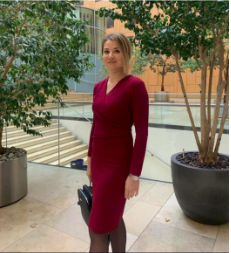
As a Ukrainian displaced person, I see civil activism as the opportunity to represent the interests of Ukrainians (Ukrainian women) in German society. An opportunity to speak and be heard. Now Ukrainians are active, but the activity is not formalised not structured. We need to create an organisation that unites people and their ideas.
Tetiana Furmanets
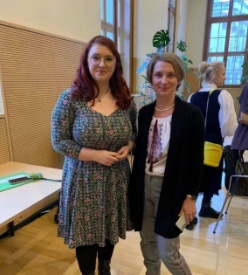
Foremost, civic engagement implies movement, I perceive this concept as a movement for qualitative social change.
For most Ukrainian refugees, being active means survival. After all, we must first learn the peculiarities of the social group to which we are resettling, identify our place in this society, realise our rights, and take on responsibilities-in short, integrate into the long-established system. And all this is possible only through interaction and contact with others. This path is long, and tiring, but exciting.
Kateryna Vitenchuk
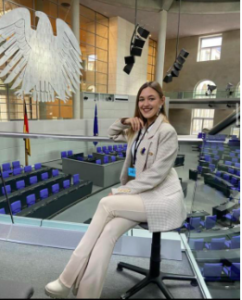
For me, civic engagement is an opportunity to help and unite people.
In times of war, when everyone has come to another country, not by choice, it is essential to support each other, to show that you are not alone and that you can cope with everything.
Ukrainians in Germany are very active now, they raise important topics, go to rallies, donate, cover issues related to the war, and support compatriots. In the first months of the war, I did a lot of volunteering, and went to meetings and rallies, but I was lonely and did not have enough people around. So I founded in Germany a community for Ukrainian entrepreneurs called Mind Business club. In this community, we support people, hold meetings with experts and give knowledge about the legal registration of businesses in Germany. It can be called civic engagement.
Alliances with German communities, business clubs and organisations help our movement to develop and be heard. I am very pleased that in Germany has opened a lot of organisations that unite the Ukrainians; it shows that we are active people united. In the business club, we support projects, which Ukrainian businessmen are opening now, we participate in charity auctions, we donate, and we support startups and new ideas.
Ukraine needs support now more than ever. That’s why we do everything to help our country! Being not afraid to talk about the war and do everything to support our country – that’s civil activism for me!
The Ukrainian Cultural Community (UCC) is an excellent example of how resettled people in Germany can be active. They are friends of my business club, who organise exhibitions, performances, concerts and Ukrainian language evenings.
Thanks to the project “Democracy moves!”, I was able to meet representatives of different organisations in Germany, to visit Bundestag and learn more about German democracy, it is also an example of activism and how we can be heard!
I believe that with such activity in the future, more Ukrainian organisations will open, and after the war, we will bring all the knowledge, and skills directly to the native country
Olha Chubar
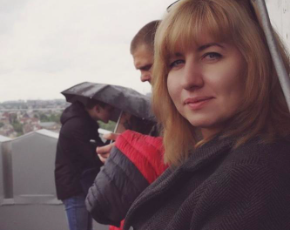
I came to Berlin from Kyiv on March 8, with no money, no strength, no acquaintances, nothing. My language skills were also zero. I spoke only Ukrainian and Russian. Being on welfare – for me, a person who can work and be a full-fledged taxpayer and resident of the country, it is very emotionally challenging.
But I believe that whoever is looking will definitely find it. I found a job in two weeks as a bakery assistant. I worked for six months until I started going to different workshops for Ukrainians. And at that point, my life changed 180 degrees. Thanks to the organizers of these events, I made a lot of important connections. Now, I have quit my bakery, developed an online project, and I am helping Ukrainians find new professions and jobs in Europe.
To develop, you need to move, go to events, get acquainted, get interested, achieve and make the world a better place. Help each other – water will not run beneath a rolling stone. Just do it!
Liza Balzhyk
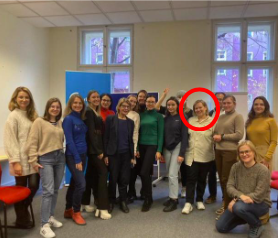
When I came here, I started looking for ways to help other Ukrainians as a volunteer. I helped at the train station, distributed humanitarian aid, and was part of the NGO Rhineo project. I can’t estimate the activity of Ukrainians in Germany, as I don’t have any statistics. But I know that there are rallies, people volunteer, and help those in Ukraine. Our strength is in unity. Meet, communicate, discuss and act!
Alina Khashchevych
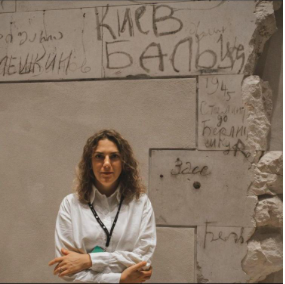
On the 24th, I left the house for two hours to work and have not yet returned. I had my phone, laptop, passport, glasses and my client’s trademark in my backpack. We went to Lviv, where my boyfriend’s relatives live. We immediately started preparing food for those who came to the train station. These were the first days before the Red Cross organized its tent city. We saw five platforms from which people were leaving, a 200-meter passage, and people waiting for their departure for 30–40 hours. I have never seen such grief in their eyes. In March, I came to Germany. After the first month of staying here, I started to work as an online coordinator at our volunteer kitchen in Kyiv. I was looking for everything: people for the kitchen, tons of meat, vegetables, and other products. It all grew into a powerful volunteer project that prepares meals for people every day. From 500 to 1000 meals a day.
What does civic engagement mean to you as a displaced person?
To be decent and patient. To know your rights and be able to defend them with respect and dignity.
Karyna Holumbiovska
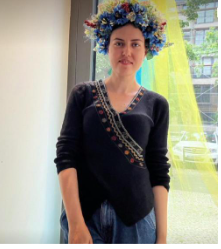
In autumn, I decided to come to Berlin, I had no clear idea where I would live, only friends who met me at the station, on the way to Germany I found accommodation with Germans for 4 weeks and by coincidence I found and signed a six-month lease, I am very grateful to people I met. Since the 24th of February in Ukraine, I felt anxious and tried to volunteer and help physically or psychologically to support me.
For me, civic engagement means creating a civic organization, holding events to draw attention to Ukraine, and winning grants.
I’m sure Ukrainian displaced persons can be active, I’ve met a lot of people who do demonstrations in Germany, get grants and create children’s spaces.